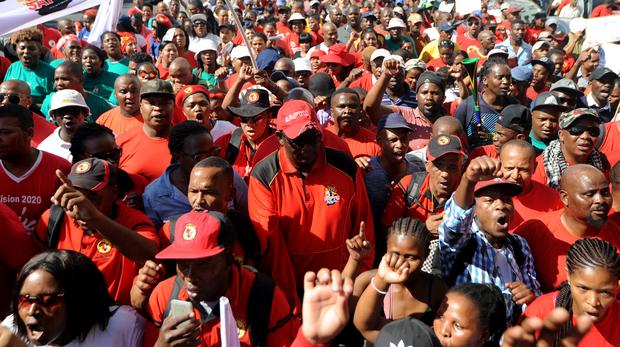South Africa. Unions and SOEs that fail to pay employee benefits are facing few to no consequences
Retirement, medical and other contributions deducted from employees’ salaries are not being paid to the relevant funds and schemes by some SOEs and unions.
In a tough economic environment, unions and state-owned enterprises (SOEs) are starting to default on employee benefits such as retirement fund and medical scheme contributions. And there are apparently few to no consequences for this behaviour.
Earlier this week, Pension Funds Adjudicator Muvhango Lukhaimane issued a ruling against the South African Transport and Allied Workers Union (Satawu) after an employee complained that his provident fund contributions had not been paid over to the Satawu National Provident Fund.
The complainant, Mr Louw, has been employed by the union since 1 February 2015. He received a letter informing him that the union had stopped paying his retirement contributions in October 2015, just eight months after his employment had started. The fund, however, continued to deduct the contributions from his salary.
The union admitted it had only made “partial payments” from October 2015 to January 2019.
The retirement fund made a submission to the Financial Sector Conduct Authority (FSCA) requesting the suspension of contributions for the period February 2019 to August 2021. The suspension was meant to allow the fund to recover from the “errant activities” (read mismanagement and corruption) of the fund’s previous leadership.
Pending the approval of the suspension of contributions, Satawu stopped deducting contributions from members’ salaries from February 2019. By January 2019, the outstanding contributions to Louw’s retirement fund amounted to R88,730.82. The submissions to the FSCA remain pending.
That a submission was made means Louw is unlikely to be the only employee in this position.
Satawu says it has financial constraints and it was negotiating with the fund to repay the outstanding contributions. However, by 3 August 2022, it had failed to pay the outstanding contributions.
The fund was ordered to calculate the arrear contributions due by Satawu, together with late payment interest. The union has to make payment within two weeks of receiving the calculated amount.
Employers’ failure to pay
Lukhaimane said as many as 40.55% of complaints for the 2021/22 financial year related to employers’ outright failure to pay contributions.
Employees can open a criminal case with the South African Police Service, but Lukhaimane said this did not happen often as employees feared dismissal.
She said retirement funds and their trustees were never held responsible for outstanding contributions, although the Pension Funds Act placed a duty on them to ensure recovery from employers.
Funds, trustees and administrators are guilty of negligence if they do not inform members of the employer’s noncompliance. Members usually only discover this when they try to put in a claim.
Post Office non-delivery
In another case of financial mismanagement, the beleaguered South African Post Office (Sapo) remains in debt to Medipos Medical Scheme to the tune of about R659-million for contributions not paid in 2020.
Sapo owes the scheme a further R58-million for a short-payment in September this year and nonpayment in October.
In addition to these debts, Sapo has been making other employee deductions that have not been paid over. These include R928-million owed to the South African Revenue Service, R769-million owed for retirement benefits, R150-million owed in outstanding salaries and R100-million owed in UIF benefits.
When Covid hit, Sapo was significantly affected from April 2020. Medipos is a closed medical scheme, which means it is only used by Sapo employees. It has about 11,000 members, with about 22,000 beneficiaries. Sapo’s more than 14,000 employees also belong to four open medical schemes — Discovery Health, Bonitas, Sizwe and Hosmed.
Although Sapo has defaulted on its medical scheme contribution payments to Medipos, there are no arrears due to the four open medical schemes, Medipos principal officer Thabi Mlotshwa contends.
The scheme engaged with the Council for Medical Schemes in December 2020 to allow Sapo a temporary exemption, as the SOE requested more time to make up the payments.
The exemption was granted and expired in December 2021. During this period, all medical scheme benefits continued to be honoured, although Sapo did not pay the arrear contributions. By August 2021, the scheme’s solvency ratio had plunged to 35.9%.
By the end of August this year, the scheme had spent almost R750,000 on legal costs, trying to claim the more than R600-million that Sapo owes.
The total monthly contribution that Sapo has to pay over is about R42.2-million.
In October 2021, the scheme threatened to suspend benefits. Solidarity took Sapo to court to force it to pay the contributions. Sapo indicated that it had a strategic plan, which revolved around a government bailout that would allow it to repay all the arrears by December 2022.
The employer then paid all contributions according to the court order (R50-million a month) until April 2022, and made partial payments in May and June (R41-million a month).
The payments fell further in July 2022 to R12-million before going back to a payment of R41-million in August.
When Sapo made the short-payment of R12-million in July, the scheme threatened to suspend benefits. To avoid this, the scheme attached Sapo’s bank accounts for R60-million, including sheriff’s fees. This was not paid, and benefits were suspended until the R60-million was paid on 13 October, at which point the suspension was lifted.
As of this week, Medipos has sent Sapo a letter of demand and, failing payment, will pursue legal action against the SOE. DM168
This story first appeared in our weekly Daily Maverick 168 newspaper, which is available countrywide for R25.
Read More @Dailymaverick
179 views










